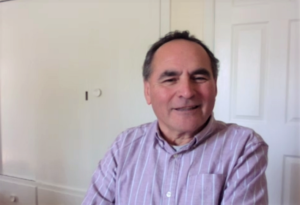2022 Governor General’s Literary Award winner Eli Baxter highlights how Indigenous knowledge holders will be teaching others

By Rick Garrick
THUNDER BAY — 2022 Governor General’s Literary Award winner Eli Baxter highlighted how Indigenous knowledge holders will be teaching others during his Entering the 8th Fire Prophecy virtual presentation on Feb. 1 at Lakehead University’s Global Indigenous Online/Virtual Speaker Series. Baxter was recognized this past November with the Governor General’s Literary Award for English-Language Non-fiction for his book, Aki-Wayn-Zih: A Person as Worthy as the Earth, which was published by McGill-Queen’s University Press in 2021.
“These prophecies come from our grandfather spirits in the Spirit World, they communicate with our Elders in our traditional ceremonies,” Baxter says. “My generation, we are the ones that are responsible to talk about and teach about the 8th Fire Prophecy.”
Baxter says the Anishinabek people’s teachings and responsibilities have always been about the land, water, and air.
“We are part of it and we cannot live without the water, we cannot live without the animals, and also the plants are Anishinabek medicines,” Baxter says. “What the Elders tell us is that the Anishinabek and the non-[Indigenous] people entering the 8th Fire, we have to go back and relearn and also, for us that know, teach about the Anishinabek knowledge of how to look after the plants and the animals, how to live the Anishinabe Mino Bimaadiziwin, which is living the good life, the lifestyle that the Anishinabek had here before European contact.”
Baxter says life before contact featured trees that grew “so thick” that it would take about 12 people to encircle the largest trees.
“At that time, there was no need for us to cut down the trees,” Baxter says. “We had all the stuff that we needed to live with the land — we had our medicines, we had our food — you must remember in our stories the lakes were just full of huge fish and we had all sorts of ducks and waterfowl to eat. We had deer, moose that lived with us at the Eastern Seaboard, we had our medicines and our way of life.”
Baxter says the Anishinabek people’s way of life before contact was well organized with their own education system and healthcare system.
“It was so good that we never developed any hospitals, there were never any hospitals when the Europeans came here,” Baxter says. “There were no jails when the Europeans came here.”
Baxter notes that many people are dying or being displaced around the world due to the effects of climate change, such as floods and fires.
“Presently, here, we are at a changing point where we have to decide to teach our Anishinabek knowledge to everybody and anybody that would listen in order to save the planet from destruction,” Baxter says. “Because of our present lifestyles, we are basically hurting the planet and the planet is healing itself. Remember that us Anishinabek, we know that the planet is a living thing. Things that are considered inanimate in the non-[Indigenous] world, for us First Nations people the inanimate objects we consider as animate, as living things. All of these entities that we live with in the Anishinabek world, we consider them having spirits.”
Baxter adds that there is a need for Anishinaabemowin programs to teach the language on the land.
“Our language holds all of that Anishinabek knowledge that we need to have as we enter the 8th Fire Prophecy so that we can live and learn and teach about our Anishinabek ways,” Baxter says.


